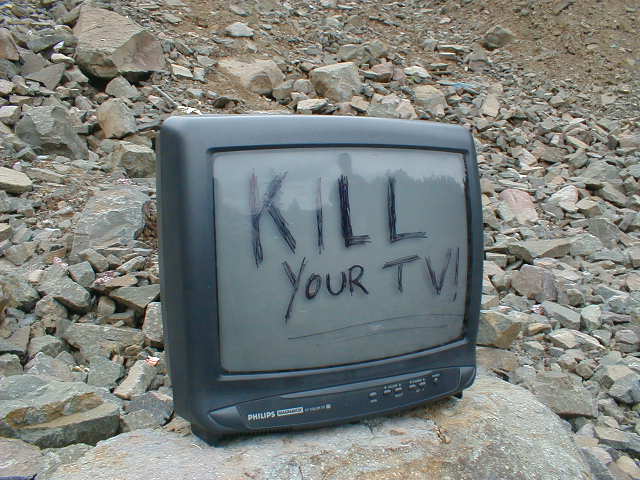It is entirely conceivable to spend a whole weekend, sitting in your pants, watching live football on TV. Someone living along the London Road could watch a Bundesliga game on Friday night, three English Premier League games on the Saturday or one from the Championship (the 3pm game may be illegally streamed on the internet), a Spanish or Italian game at night, and then two further Spanish games on Sunday along with an SPL clash and yet another EPL game. Celtic could be at home to St Johnstone a mere five minute walk away, but in competition with football from across Europe, the live football match could be ignored. I have friends who exasperate me because of their arguments that football on TV is somehow the best option. You can go for a beer, watch instant replays, they argue. Saving my rant for this article I merely respond by saying that football on TV is like sex on TV, it may be great to watch but you would rather be there yourself.
Yet, whilst I cannot see the justification in Sky or ESPN showing Wigan v Stoke when there are six thousand empty seats facing back at you, with a club like Celtic there is a different issue. Neither Wigan nor Stoke have significant global support, but Celtic does. We are lucky in the sense that virtually every away game is shown live on television. But should they be? Has football become so saturated that the younger generation will treat going to a live game as a bizarre, one-off event, resulting in the demographics of a football crowd becoming older and more cynical with each passing year? Harking back to the EPL TV coverage, my view is that, unless the game is 95% sold out, it should not be shown live for people to watch from their living room. The NFL, a league which thrives upon its income from television, does not show live matches locally if they are not sold out 72 hours before kick-off. Local supporters are thus encouraged to attend the game, thereby safeguarding the continuation of live support in future generations. If television could show everything, would we see empty stadiums even for the so-called big games?
Should the same policy be adopted in Scotland? The NFL defines local as 75 miles due to the size of the country and the distances between franchises. If this radius applied to Scotland Celtic’s radius would include many league clubs, but what about a 20 mile radius? Realistically, the only Celtic home games shown on television are the Glasgow derbies, the European games and the odd end of season clash, but last year’s Scottish Cup game was not sold out. Should this have been ‘blacked out’ from Dumbarton to Coatbridge? If matches were on free to view television, the argument would have less substance, but with a Sky package not being cheap is it better to spend money going to a live game than on a subscription? The most prevalent argument against this is that people cannot simply afford football. An average adult ticket in 1989 was £3. By 2011, it is over £50 (EPL figures). It is interesting to note that across the UK the average age for a football supporter is 41. In the 1980s, despite football being riddled with tragedy, hooliganism, and a poor product on the pitch, being taken to your first live football match was a rite of passage that excluded very few in society on the grounds that it cost too much.
Have we simply become too spoilt? I have heard Celtic supporters moaning because they cannot find a bar in Croatia/Timbuktu/The Moon to watch the away game against Aberdeen. There is now an acceptance that all Celtic away games will be shown on television. Celtic, unlike the provincial clubs down south, does not just draw its supporters from a 20 mile radius of the city, but are a worldwide entity. However, is it the responsibility of those who are fortunate enough to live near the park to attend the games, ensuring that future generations also understand the beauty of live football? Celtic’s attendances have suffered, along with many clubs, due to the recession. It is not just the responsibility of supporters to attend; clubs need to take a long hard look at themselves. Sadly, down south, I fear that many owners do not care about the sanitised atmosphere caused by empty seats, as the money received for TV coverage more than compensates this, financially if not atmospherically.
For Celtic supporters living miles from Glasgow, television coverage is beneficial. It would be disappointing to rely on this coverage, where your eyes are being told what parts of play to watch by someone else, at the expense of making the wonderful pilgrimage to Celtic Park if finances allow. For a club as big as Celtic, is it embarrassing that there are 10,000 empty seats without hooped clad supporters occupying them? Is this caused by the prices, the lack of competition in the league, or internet streaming? Whilst TV coverage can be regulated, can internet streaming be stopped? When there is a game that has been sold out in advance, it is right that supporters watch by whatever means, but is it right to choose a stream on a Saturday afternoon over being there? Again, I am referring to those living in close proximity to Glasgow. Football fans are being priced out, and the rite of passage that all of us have gone through may be more of a novelty in the future. There is no concrete conclusion here, just a statement that with too much TV coverage, football will continue to eat itself.





